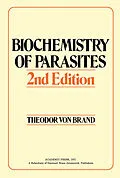Biochemistry of Parasites, Second Edition presents the biochemical aspects of parasitology. The topics covered in the book include inorganic substances; carbohydrate relationships of parasites; parasitic metabolism of carbohydrates and transport mechanisms; distribution of lipids in the bodies of parasites; and disturbances in the host's protein metabolism during parasitic infections. Parasitologists and biochemists will find the book interesting.
Inhalt
Contents
Preface
Preface to the First Edition
Chapter 1. Inorganic Substances
I. Quantitative Considerations
II. Formed Inorganic Deposits
III. Pathological and Experimental Inorganic Deposits
IV. Intimate Distribution of Ash Constituents
V. Transport Mechanisms
VI. Metabolism of Inorganic Substances
VII. Influence of Environmental Inorganic Substances
VIII. Some Experimental Uses of Radioactive Inorganic Substances
IX. Host Inorganic Substances in Parasitic Infections
References
Chapter 2. Carbohydrates I. Distribution and Nature of Carbohydrates
I. Introductory Remarks
II. Distribution of Low Molecular Weight Carbohydrates
III. Chemistry of Reserve Polysaccharides
IV. Quantitative and Qualitative Aspects of Reserve Polysaccharides
V. Structural Polysaccharides
VI. Serologically Active Polysaccharides
VII. Incompletely Characterized Polysaccharides
References
Chapter 3. Carbohydrates. II. Metabolism of Carbohydrates
I. Transport Mechanisms
II. Assimilation of Carbohydrates
III. Leakage of Carbohydrates
IV. Synthetic Processes
V. Digestion of Carbohydrates
VI. Utilization of Endogenous Carbohydrate Reserves
VII. End Products of Aerobic and Anaerobic Fermentations
VIII. Glycolysis and Some of Its Variants
IX. Terminal Anaerobic Processes
X. The Pentose Phosphate Pathway
XI. The Tricarboxylic Acid Cycle and Its Variants
XII. Characteristics of Krebs Cycle Enzymes and Terminal Aerobic Processes
References
Chapter 4. Carbohydrates III. Host-Parasite Relationships
I. Disturbances of the Host's Carbohydrate Metabolism during Protozoan Infections
II. Disturbances of the Host's Carbohydrate Metabolism during Helminthic Infections
III. Disturbances of the Host's Carbohydrate Metabolism during Arthropod Infections
IV. Host Dietary Carbohydrates and Parasites
V. Carbohydrate Metabolism of Parasites and Chemotherapy
References
Chapter 5. Lipids
I. Chemistry of Lipids
II. Distribution of Lipids in the Bodies of Parasites
III. Lipid Absorption and Digestion
IV. Lipid Synthesis
V. Lipid Utilization and Degradation
VI. Disturbances in the Host's Lipid Metabolism during Parasitic Infections
VII. Parasite Lipids and Chemotherapy
References
Chapter 6. Proteins
I. Total Protein Content and Protein Fractions
II. Heme Compounds
III. Proteases
IV. Antienzymes
V. Absorption of Amino Acids
VI. Synthetic Processes
VII. Utilization and Degradation of Proteins
VIII. Disturbances in the Host's Protein Metabolism during Parasitic Infections
IX. Host Dietary Proteins and Parasites
X. Parasite Proteins and Chemotherapy
References
Chapter 7. Nucleic Acids
I. Distribution
II. Quantitative and Chemical Considerations
III. Synthetic Processes
IV. Degradation Processes
V. Disturbances in the Host's Nucleic Acid Metabolism during Parasitic Infections
VI. Nucleic Acids of Parasites and Chemotherapy
References
Chapter 8. Vitamins
I. Vitamins in Parasites
II. Vitamin Requirements of Parasites
III. Influence of Parasites on the Vitamin Content of Host Tissues
IV. Influence of the Host's Dietary Vitamins on Parasites
References
Chapter 9. Respiration
I. Introductory Remarks
II. In Vivo and in Vitro Oxygen Relationships
III. Factors Influencing the Aerobic Gaseous Exchanges
IV. The Postanaerobic Respiration
V. Respiratory Chains
VI. Electron Transport-Linked Phosphorylations
VII. The Carbon Dioxide Transport
VIII. Host-Induced Variations in Respiratory Exchanges of Parasites
IX. Influence of Parasites on the Respiration of the Host
X. Parasite Respiration and Chemotherapy
References
Appendix
Author Index
Subject Index
